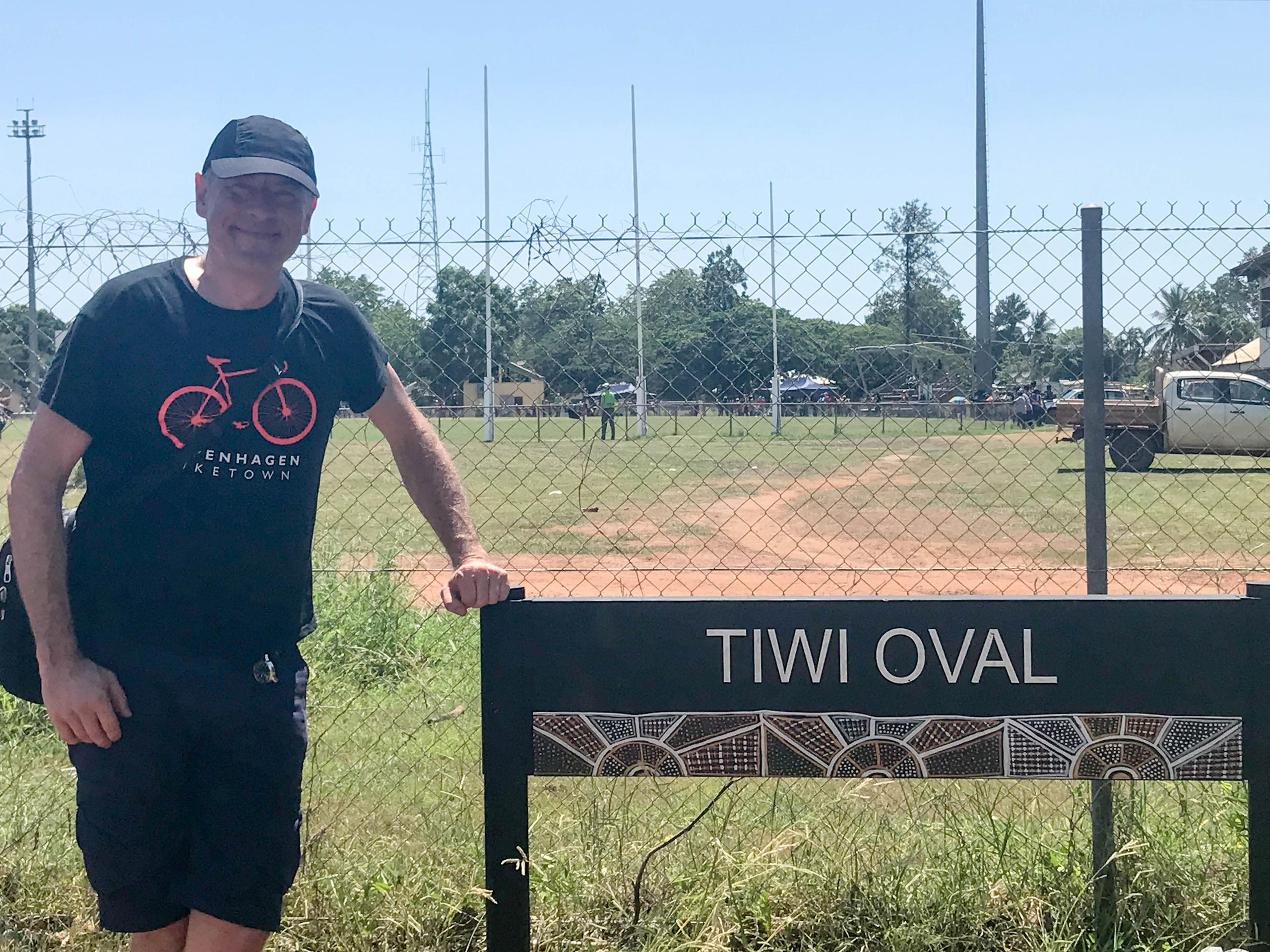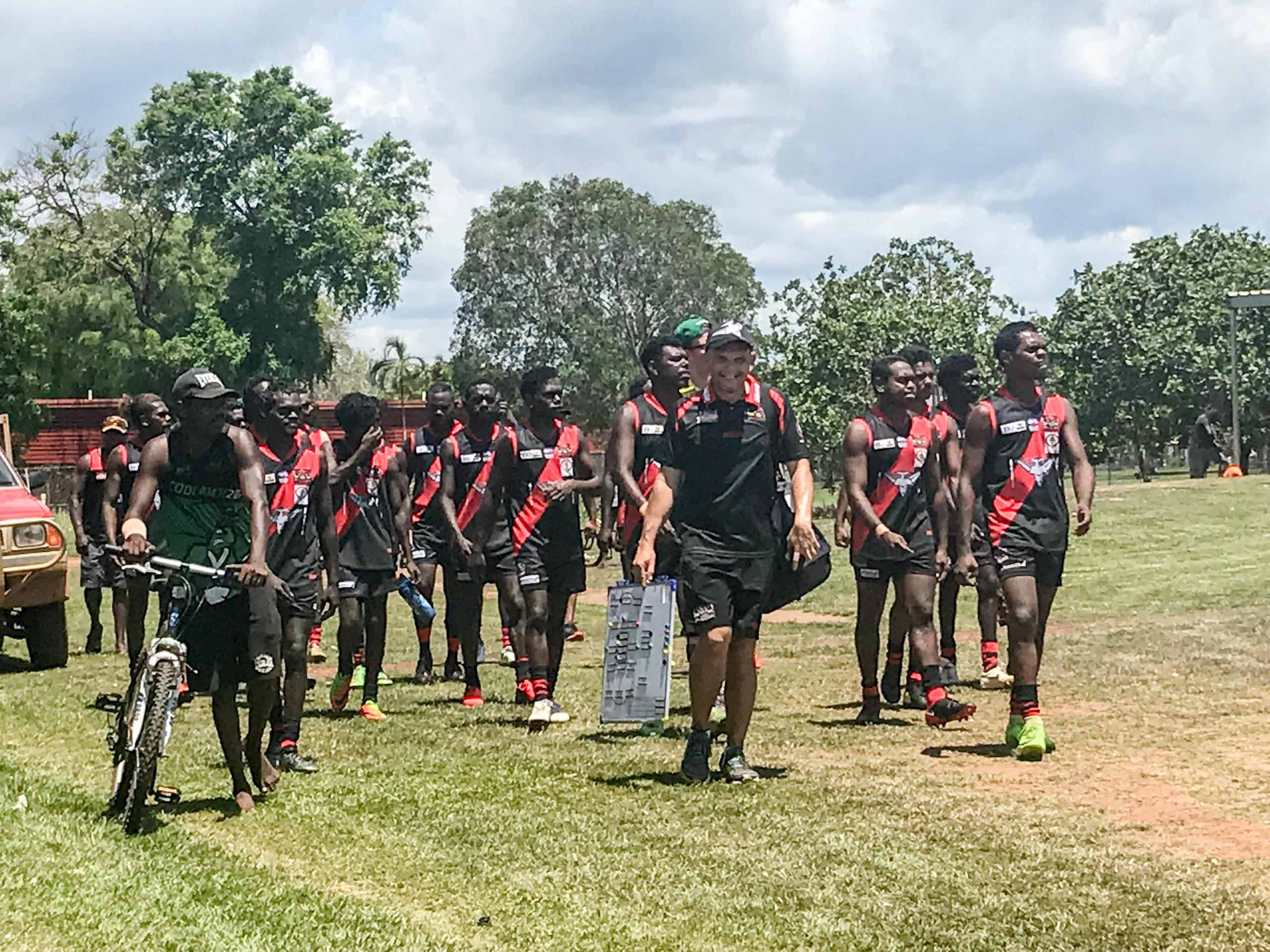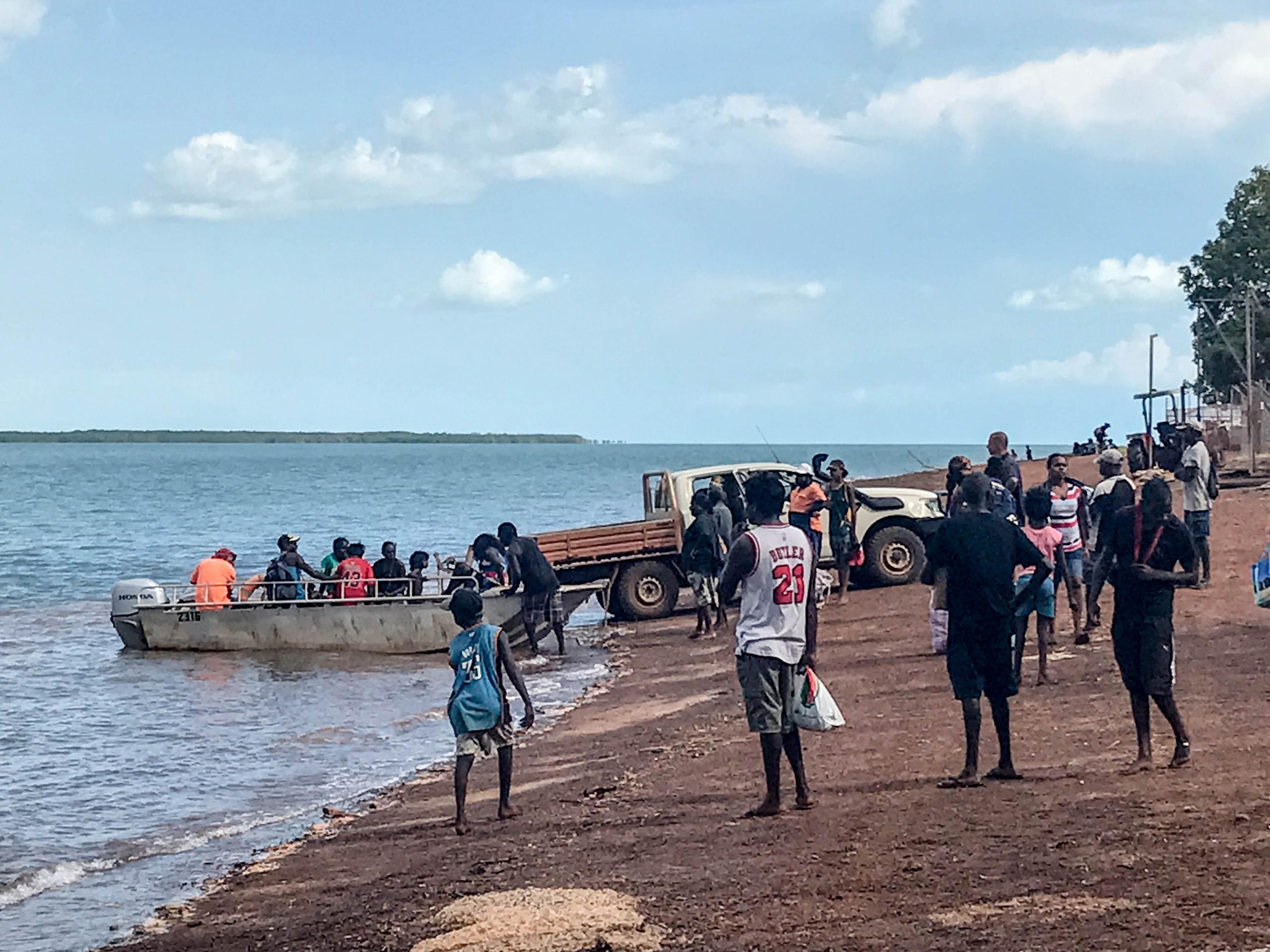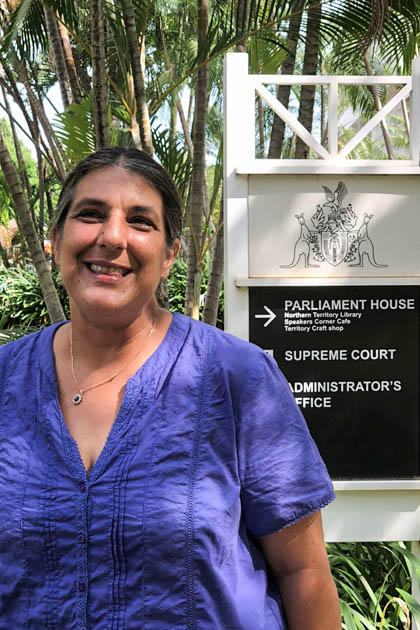
Struggling for democracy in remote Australian islands

People power may be possible in democratic regions with self-rule, but people in some of Australasia’s remoter places struggle to get their voices heard.
On the latest leg of my #ddworltour I got the opportunity to visit the secluded Tiwi islands, part of Australia’s Northern Territory (NT) isolated from the mainland.
There is no jetty in Wurrumiyanga. “Be careful when jumping onto the beach, and mind the crocodiles,” urges the captain of the small SeaLink Ferry which brought us across the Timor Sea from Darwin, Australia.
We are a small group of visitors including a team of footy players, who jump one by one onto the beach of the Tiwi capital. Footy is the Australian version of American football, with rules that are incomprehensible to this #ddworldtour notebook writer but are nevertheless my entry ticket to an unknown world.
A few times a year the very strict entry rules are waved for non-Tiwis when the local footy team, the Tiwi Bombers, are hosting another team in the local stadium, the Tiwi Oval.

The game lasts four hours under a brutal sun, with temperatures well into the mid-40s Celsius (104 °F). But the players and the enthusiastic crowd seem not to notice. They run, they scream, and they celebrate.
Alone for 10,000 years
The Tiwi-islands, off Australia’s northern coast, comprise some 8,320 square kilometers of eucalyptus, paperbark, coastal wetlands and deserted beaches. There are two main islands, Melville and Bathurst, and many smaller ones.
These islands have been cut off from the Australian mainland since the last ice age more than 11,000 years ago. This seclusion has resulted in a unique culture and language. “Life has always been hard here,” says a local footy fan in his mid-fifties standing next to me at the game. “We have all possible lethal animals and very unfavourable conditions for agriculture.”
There is little work here, with 80% of the people unemployed. They spend their days sitting on the porch of their small houses waiting for some upcoming footy game, or worse, the weekly opening of the “social club”. For three hours every Friday, people try to drink as much as possible. The consequences are awful, with a lot of family problems, domestic violence and suicideExternal link, especially among the young population.
Tiwi and Qaanaaq
As unknown as this country is to me, it’s historic narrative appears familiar. I have seen and experienced similar situations in once-upon-a-time very proud but isolated cultures across the globe.
For example, a few years ago I took the first scheduled flight into Qaanaaq in the far north of Greenland. It is home to the Inuit, a few thousand people with their own culture and language.

As on Tiwi, I met a lot of broken characters and structures. In both cases, foreign colonialists at some point last century tried to catapult these (in their view retarded) cultures into modernity by brutally suppressing them.
Politically and legally these severe mistakes have been understood to some extent. In the case of the Tiwi people and other first nations across Australia, their sovereignty was acknowledged by a colonial Court in New South Wales as early as 1841External link.
In reality, it took more than 125 years to amend the Australian constitution in such a way that the indigenous people of the country were accepted as equals. On May 27, 1967, a federal constitutional referendum for such an amendment was approved by more than 90% of the electorate.
This was a powerful signal to change track. But more than 50 years later, the current conservative government of Malcolm Turnbull recently rejectedExternal link a new referendum proposalExternal link — established by a long consultation process among all first nations in Australia – to strengthen Aboriginal representation in the national political bodies and allow for new treaties to be signed on indigenous sovereignty and control of local natural resources.
Mining and fracking
Instead the Canberra government wants to “assist” these nations by allowing international companies to developing mining and fracking “also on the Tiwi”, as Pauline Cass, the coordinator of the Lock the Gate alliance tells me back in Darwin, where I met her outside the Northern Territory (NT) Parliament House.

Later this spring the NT Labour government, which won a landslide in the last election when it opposed fracking, will probably now give the fracking plans a go-ahead.
“We are demanding a popular vote on this decision, but have no formal citizens’ initiative rights available,” says anti-mining and fracking campaigner Cass.
The short-sighted and purely economy-driven approach to local and indigenous communities has nevertheless recently mobilised many people in many places including the Tiwi-islands, where the directly elected CouncilExternal link has organised consultation meetings in most of the towns and villages across the nation.
But in a place like that, democracy seems to be between a rock and a hard place. After decades of colonial subordination, the political culture is very weak, and the traditional links to former family and tribe structures are mostly broken.
Additionally, the weak economic situation tempts these communities to sometimes engage and accept bad deals with foreign governments and companies.
For example, a recent development plan for a proper harbour on the Tiwis got a local yes, as it was linked to the promise of a woodchip export businessExternal link, a promise that was not kept.
Broken promises
There are many similar struggles and broken promises across Australasia, a region with a wealth of peoples and countries without the privilege of being independent nation-states.
One such country is West Papua.
Once on the United Nations list of to-be-decolonised countries, it covers an area as big as Sweden (about 420,000 square kilometers) and has a population of three million people.
Together with the eastern part of the island called Papua New Guinea, West Papua was retained by the Dutch after Indonesian independence in 1945, but later annexed by the Jakarta dictatorship.
While Indonesia has come a long way towards more democracy and devolution in the last 20 years, the people of West Papua still suffer under hard Indonesian rule.
A recent nationwide petition in West Papua (which Indonesia had banned) made clear that about 70% of the people in this country would like to have the opportunity to vote on their future status. It was handed to the UN last September.
Bougainville
Just across the border to the east, independent Papua New Guinea (PNG) is about to allow one of its parts, the autonomous island region of Bougainville, to vote on its national status on June 15, 2019.
This was agreed in a 2005 peace agreement after a long and bloody independence war. An international observer group is already in the country, which is the same size as the Tiwi-islands, to prepare for the popular voteExternal link.
While seen as a possible model for other parts of the world, there are already some signs that the PNG government wants to backtrack on its promises.
PNG Prime Minister Peter O’Neill said recently that the popular vote in Bougainville may “not be possible”, saying pre-conditions such as “rule of law, proper establishment of government structures and disposal of weapons” still need to be met.
Luckily, there is still more than a year to go before the 175,000 people of Bougainville are to decide in a referendum. A failure of the process would be a very bad signal for democracy, not just in Australasia but across the globe.
Swiss-Swedish author and journalist Bruno Kaufmann is on a world tour to explore the state of democracy visiting more than 20 countries on four continents until May 2018.
swissinfo.ch publishes a weekly Notebook and multimedia reports by Kaufmann over the next few months as part of its coverage of direct democracy issues.
Kaufmann’s democracy world tour is mainly sponsored by the Swiss Democracy FoundationExternal link, where he is the director of international cooperation. The Swiss Democracy Foundation hosts various projects and platforms linked to participatory and direct democracy across the globe, including Democracy InternationalExternal link, the Direct Democracy NavigatorExternal link and the Initiative and Referendum Institute EuropeExternal link.
Follow the tour on social media with#ddworldtour, @kaufmannbruno, @democracyreporter and on people2power.info

In compliance with the JTI standards
More: SWI swissinfo.ch certified by the Journalism Trust Initiative




























You can find an overview of ongoing debates with our journalists here . Please join us!
If you want to start a conversation about a topic raised in this article or want to report factual errors, email us at english@swissinfo.ch.